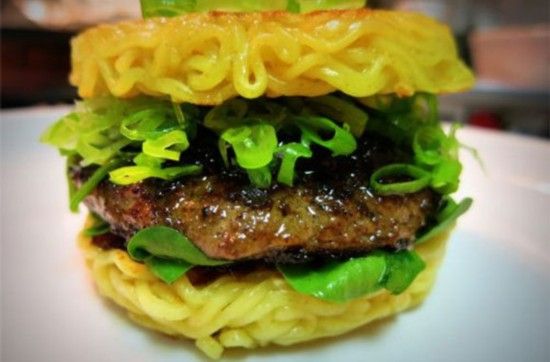
Burgers
漢堡
For years Matsumoto Kozo owned and ran a restaurant in Tokyo, cooking yoshoku, which is the Japanese word for the Western food that came to Japan over 100 years ago. Then Kozo got a chance to go to America and manage a couple of restaurants for Japanese investors. He moved to Los Angeles and lived in a strange little hotel called the Magic Castle, just a couple of blocks uphill from Hollywood’s tourist strip.
多年來,kozo在東京擁有并經(jīng)營著一家餐館,主營yoshoku,這是日語中對100多年前引入日本的西餐的稱謂。之前kozo有機會來到美國,為日本投資者打理兩家餐館。他來到洛杉磯,住在名為魔法城堡的小旅館,從好萊塢景區(qū)上坡,到旅館只有兩條街區(qū)。
One day there was a big barbecue party down by the pool. This was the early 1980s, and the glamorous, glittering, feline cast and crew of Cats were bunking at the Magic Castle, too. It was their day off. When they saw Kozo and his family come out of their unit, they insisted that he join the party. They were grilling burgers over an open flame. But it was 3 in the afternoon and Kozo had already eaten. So he asked if he could wrap up the burger to enjoy later. No way, the Cats said, you can’t save a burger like that. You’ve got to eat it here and now. It wasn’t his first hamburger—he’d eaten one before at McDonald’s in Tokyo and at MOS Burger, a Japanese chain. But this flame-grilled, all-beef patty was something categorically different.
有一天,在游泳池邊組織了一場盛大的燒烤派對。當(dāng)時是80年代初,當(dāng)時歌劇《貓》的劇組人員正在參加派對。當(dāng)看到kozo和家人走出房門,他們堅持kozo加入晚會。他們在篝火上烤漢堡。當(dāng)時是下午三點鐘,kozo已經(jīng)吃了午餐。因此,他問是否允許他把漢堡打包稍后再吃。他們說不可以,你不能這樣子保存漢堡,必須及時吃掉。這并不是他第一次吃漢堡,他之前在東京的麥當(dāng)勞以及日本連鎖店摩斯?jié)h堡里都吃過,但這次的火焰燒烤、全牛漢堡完全不一樣。
When he moved back to Japan a few years later, Kozo thought back to that afternoon at the Magic Castle. He found a place in a residential Tokyo district called Gotanda. It was big enough for a restaurant and a little garden. This was 1990. There were a handful of burger joints already in Japan, but they served burgers as a fast-food snack. (Now there are around 2,000 independent Japanese-run burger places, Kozo says.) He built a real restaurant with a station for grilling burgers in the middle. He enlisted the help of a friend to design a menu that was suitably American, printed on brown paper, with a logo that featured a chef holding a spatula and tossing a plate. He called it 7025 Franklin Avenue, the street address of the Magic Castle Hotel.
當(dāng)幾年后他回到日本,kozo想到了在魔法城堡的那個下午。他在東京的一個名為gotanda 的聚居區(qū)找到了一個地方,足夠開個餐館和一個小花園。那是1990年,日本已經(jīng)有了幾家漢堡連鎖店,但他們只是把漢堡作為快餐來銷售。(kozo說,現(xiàn)在日本已經(jīng)有2000多家獨立的漢堡店。)他開了一個餐館,屋子中間有一個臺子用于烤漢堡。他列出菜譜,一位朋友幫他設(shè)計了美國化的菜單。菜單印在棕色紙上,上面有個標(biāo)識圖案,顯示一個廚師拿著鏟子,擺弄著一個盤子。他把餐館命名為富蘭克林大道7025號,也就是魔法城堡在美國的地址。
Kozo still mans the grill nearly every day, though he does have a Nepalese chef who has been working by his side for years, and whose daughter cashiers and waits on tables. The cheeseburger I order, made from Australian beef, is simple and superior. The char is unmistakable, and the meat has a consistency and flavor, so familiar at home, that I have never seen replicated abroad.
雖然一個尼泊爾大廚已經(jīng)在他身邊工作了許多年,但kozo仍舊每天做著燒烤,大廚的女兒作為收銀員和服務(wù)員。我點了一份干酪漢堡,由澳洲牛肉制成,簡單卻美味。烤的恰到火候,牛肉均勻,味道鮮美,像自己家里的味道一樣。在國外我從未品嘗過類似的漢堡。
I ask Kozo whether he’s been back to the Magic Castle or to the States since returning here in 1985. "I've never been back," he says, tears forming in his eyes. "I always wanted to go, but I haven't made it yet. Which is kind of amazing, since this whole business is thanks to America. This is what I found in America and wanted to bring back to Japan."
我問kozo1985年回國后,是否再回過魔法城堡或美國。“我再也沒回去過”他眼中泛著淚花說。“我總想回去,但都沒成行。這有點讓人驚訝,因為我的所有生意都要歸功于美國,我在美國發(fā)現(xiàn)了這種做法并且?guī)У饺毡尽!?br />
n. 產(chǎn)品,農(nóng)作物
vt. 生產(chǎn),提出,引起,











